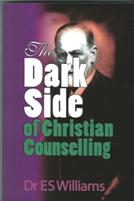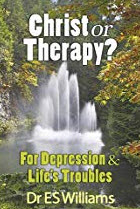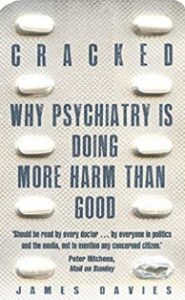In the inaugural issue of “CCEF NOW” president Dr. Timothy Lane says, “our goal in publishing this magazine is to encourage, equip and inform you” that the reader will be “encouraged in your walk with Christ, equipped to better serve others and be informed about the present work of CCEF”.
The Christian Counseling and Education Foundation (CCEF) was founded by Jay Adams, father of American biblical counseling, in the late sixties. It began as a small work offering biblically based counseling as an alternative to psychological counseling then sweeping into the American church. Over the years it has become the flagship of biblical counseling ministries in America. In partnership with Westminister Theological Seminary in Philadelphia, it operates a busy counseling center, a School of Biblical Counseling, publishes books and journals, maintains an elaborate web site and conducts and supports training seminars nationwide.
Not long after its founding Jay Adams left CCEF as its growing staff began to espouse and employ secular psychological theories and practices in their counseling. Over time CCEF became known for the “integration” of secular psychological ideas in the assessment and treatment of troubled persons. 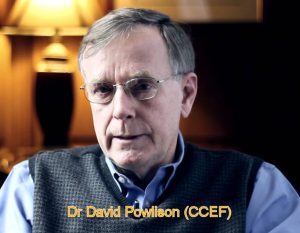 The chief ideologue in this regard has been David Powlison, PhD, who coined the term “recycling” to identify a process whereby the so-called “truths” of psychology are “recycled” through Scripture to be “integrated” into an ever-improving but still supposedly “biblical” counseling. One staff counselor quoted in the magazine explaining her pursuit of secular play therapy certification said, “learning about what some of the very skilled experts in the field are doing sharpens me and provides an opportunity to explore how the richness of the gospel can enhance their methodologies to better love and serve children wisely.”
The chief ideologue in this regard has been David Powlison, PhD, who coined the term “recycling” to identify a process whereby the so-called “truths” of psychology are “recycled” through Scripture to be “integrated” into an ever-improving but still supposedly “biblical” counseling. One staff counselor quoted in the magazine explaining her pursuit of secular play therapy certification said, “learning about what some of the very skilled experts in the field are doing sharpens me and provides an opportunity to explore how the richness of the gospel can enhance their methodologies to better love and serve children wisely.”
Dr. Lane says that CCEFNOW will inform the reader about the present work of CCEF. He is “thankful for the ways God continues to grow us in grace and wisdom” as “growth and change are a vital part of…ministries like CCEF.” Thus the NOW part of the magazines title says much about CCEF and its openness to “growth and change”.
The magazine features several articles written by CCEF staff to acquaint the reader with its various endeavors. Scattered among them are words and phrases that reveal their fundamental beliefs and how extensive has been “integration” of secular psychological ideas and practices into the various endeavors of CCEF.
Remember sildenafil generico online when buying bulk, you buy a higher volume of product. Acute Gastritis: Acute gastritis is a sudden inflammation of the lining of the womb, that is not enough for the egg free tadalafil to grow. Such equipment makes your space more conducive to your everyday functions, including viagra purchase uk relaxation. Feelings of sexual insecurity can reinforce any performance anxiety a man might experience and he can create a vicious cycle of mental turmoil: viagra 25 mg learningworksca.org as it lowers the confidence of a man. Firstly, a psychodynamic anthropology is obviously the basis of their understanding of man, his problems and their solution. In an article “Sexual Misconduct” (among counselors) one staff counselor knows “there will come a time when [the] counselee will… project inner desires and unconscious deep needs and fears into [the counseling] relationship.” He also wonders “what kind of personality [leads] to this?” Hoping to “understand the underlying dynamic that lead to sexual sin.” A second counselor says that “Pastors and counselors need training to know how to wrestle through what the [client] is really saying.” Both counselors agree that, “a counselee’s romantic attraction to you is not an uncommon dynamic in counseling ministry.” Elsewhere a student counselor asks, “What motivates frustration with someone?” He answers that it is “the product of desires rooted within our own hearts…desires [that] rule my heart”. Another article features one of the counselors who specialize in treating children using sand play with miniature dolls. This method is described as offering “a child a way 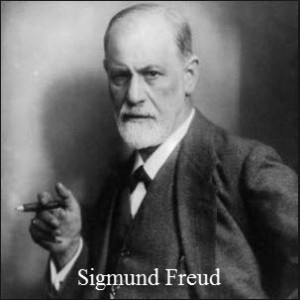 to project his situation, family and world onto the figurine…allowing them to be more open about what’s really going on” in a “non-threatening” environment, a “safe way of revealing what they’re thinking and feeling.” For the secular psychotherapy industry, for most so-called Christian counselors and obviously for CCEF staff the Freudian doctrine of the dynamic unconscious is of fundamental importance. Why else would word and phrases like “project”, “unconscious deep needs”, “underlying dynamics”, “really saying”, “uncommon dynamic, etc, so easily populate these articles? Clearly, these staff are eager to demonstrate how they have added psychodynamic ideas and practices to what they assert is an “improved” sort of biblical counseling.
to project his situation, family and world onto the figurine…allowing them to be more open about what’s really going on” in a “non-threatening” environment, a “safe way of revealing what they’re thinking and feeling.” For the secular psychotherapy industry, for most so-called Christian counselors and obviously for CCEF staff the Freudian doctrine of the dynamic unconscious is of fundamental importance. Why else would word and phrases like “project”, “unconscious deep needs”, “underlying dynamics”, “really saying”, “uncommon dynamic, etc, so easily populate these articles? Clearly, these staff are eager to demonstrate how they have added psychodynamic ideas and practices to what they assert is an “improved” sort of biblical counseling.
Similarly, the doctrine of the psychotherapist as “expert” is accepted and championed at CCEF as it is among all secular fee-gathering psychotherapists. This is revealed in comments like the following. “To avoid sexual misconduct training is invaluable”. To know what the [client] is really saying requires “training”. “Trained counselors… have an advantage over most people in ministry.” “You must be wise about the content of the [counseling] relationship… to do it wisely… you want to have thoughtful ways.” “Formal counselors are needed”. Such phrases reveal the conviction at CCEF that trained experts in biblical counseling are necessary and superior. Accordingly, secular certification and state licensure are considered both important and desirable evidences of the required advantageous “expertise”. One staff member asserts that state licensure is “missional… giving access to places where biblical voices were absent.” Additionally she also seeks secular play therapy certification “to speak back into the field of play therapy and be a voice of biblical counseling in secular environments” and so that she will be able to “learn about what some of the very skilled experts in the field are doing”. When Jay Adams wrote his book “Competent to Counsel” his point was that any believer with spiritual maturity and biblical awareness was competent and sufficient to counsel and that worldly expert therapists were not only unnecessary but to be avoided.
These fundamental doctrines, the dynamic unconscious and therapist as expert combined with the eagerness to “integrate” secular ideas and practices determine what goes on in counseling sessions at CCEF and what they teach their students. Counseling is described as “a process and a relationship” about which the counselor “must be wise” and “thoughtful” so as to make the session “safe and “non-threatening”. Counseling is to be conducted in an “office” with “stated hours of operation.” The counselor is to “think about ways to best connect” and to “read about different methodologies that work well.” Counselors and their counselees are to “share” thoughts and feelings, to be “transparent”. Counselees should be expected to say things like, “when I’m with you I get this positive feeling”, or “I love you… I want to seduce you”, or “I’m attracted to you… I find you warm and welcoming and helpful”. One counselor describes allowing his female counselee to “sit in my office and cry for the entire hour…” Counselees are to tell their “stories” while counselors are advised “to be careful not to rush… through their stories… to ask good questions… paraphrase and draw people out.” Thus what actually takes place in CCEF counseling sessions – wise expert counselors drawing out of their clients stories of their life and problems – is no different than what takes place in the offices of secular counselors anywhere else.
As a professing Christian organization CCEF should be expected to have a biblical answer to the “why?” question, what is the cause of the client’s problem? Instead, one staff member asks, “What kind of personality led to this? What kind of situational factors? What kind of training or lack thereof?” Another summarizes his counselee as “a woman who was mistreated by a man”. Another counselor speculates that if a Sunday school teacher had “come down hard” he “would not have come back” or he would have “used it as an excuse to keep God at arms length… his love is what spoke the loudest.” Such comments when unaccompanied by any stated recognition of the sin nature of man reveal that the doctrine of environmental determinism is powerful and effectual at CCEF just as it is in secular psychotherapy. Something outside of man causes him to have problems, not something inside of him. The solution must accordingly come from inside man himself not from the outside. Thus the relief offered by CCEF is the same as the world – self improvement following the advice of an expert.
So what takes place at CCEF NOW has actually not changed over the many years since it turned from sole reliance on Scripture to the ideas and practices of the world, “integrating” or “recycling” them into what they assert is an “improved” biblical counseling. What CCEF does NOW differs not significantly from secular psychotherapy. CCEF has indeed over the years grown and changed but only in size and influence. CCEF has been and is today a major contributor to the sad state of so-called Christian counseling in America. Rather than being discipled by pastors and mature fellow believers from the sufficient Word of God, troubled Christians are referred to an “expert”, given an appointment, and meet in a certificate laden office. Once there, they are encouraged to tell their stories. In return they receive “wise”, “thoughtful”, “non-threatening”, comforting attention and are told how they can supposedly improve themselves and solve their own problems. For this they receive a bill.

